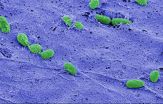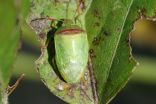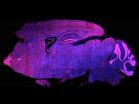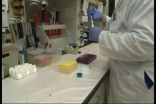(Press-News.org) TALLAHASSEE, Fla. -- In the second part of his lab's recent one-two punch, Florida State University researcher Daniel Kaplan said he has solved a cell division mystery in a way that will intrigue the makers of cancer-fighting drugs.
The key, said Kaplan, a College of Medicine Department of Biomedical Sciences researcher, is a protein called Treslin.
"It can target cancer cells," he said. "Most chemotherapy also targets rapidly dividing normal cells, but this seems to have promise for not doing that. Drug companies are going to be excited."
Before cells can divide, their DNA must be copied. In addition, the strands of the DNA's famous double helix must be unwound, via a protein called helicase. One strand needs to be inside the helicase ring, the other outside. As Kaplan's lab reported last year in the Journal of Biological Chemistry, a kinase -- that is, a protein that chemically modifies other proteins -- called Cdc7 opens up the helicase ring to let one strand out.
But not until this summer, in a paper published in Proceedings of the National Academy of Sciences, did Kaplan and Research Faculty Irina Bruck figure out that Treslin was also a key ingredient -- in two ways.
"We had tried to reconstitute the chemical modification step in our lab," Kaplan said, "but we always had a weak reaction. Dozens of other labs published this kind of work, and it was always weak. Always in the back of my mind I was saying, 'Maybe something's missing.' It occurred to me that there must be some kind of activator. So we started trying different proteins."
Eventually they singled out Treslin. (It's called Sld3 in budding yeast, which their lab and others often use because the cells are similar to humans' but grow much faster.) Treslin not only stimulates the chemical modification of the helicase, thereby activating it, but also assembles the helicase in preparation for cell division. Since cancer is the unregulated division of cells, knowing how to stop the division process is crucial to halting cancer.
"We think this is really important," Kaplan said, "because now we can take this purified Treslin and the helicase, put them in a tube and watch the chemical modification occur. Then we can add small molecule inhibitors to see if we can inhibit that. That should stop activation of the helicase. That should stop the cancer cells from dividing. You kill cancer cells but not normal cells."
Florida State has filed a provisional patent. It has a year to find a drug company interested in partnering to develop a small molecule inhibitor.
"Dr. Kaplan continues to make important and innovative advances in our understanding of the mechanisms of DNA replication control," said researcher Tim Megraw, also on the Biomedical Sciences faculty. "His new findings reveal the novel functions of Treslin to regulate the DNA helicase, a key macromolecular machine that controls DNA replication. This latest discovery is very exciting."
Kaplan finds the work fascinating.
"Evolution has done such a good job of producing molecules to perform these exquisitely, highly regulated chemical reactions," he said. "It's just a big bucket of chemistry in a cell, and it's very precisely regulated and orchestrated. We now know that Treslin is kind of a conductor."
But how does that one DNA strand actually come outside the helicase ring before cell division? What stabilizes it once it's out? What causes the ring to close again? For Kaplan and Bruck, seeking those answers is the next step.
INFORMATION:
SAN DIEGO, Calif. -- (Aug. 24, 2015) -- A new survey on sexual victimization issues at the University of Oregon reaffirms previous findings that there is a need to increase awareness about available services, while decreasing negative perceptions of institutional support.
Psychology professor Jennifer Freyd provided preliminary findings of the UO survey at the 20th International Summit & Training on Violence, Abuse & Trauma during a keynote session on "Campus Sexual Assault: Current Research and Prevention Approaches."
New issues also surfaced among the key findings ...
CAMBRIDGE, Mass. (August 24, 2015) - By teasing apart the structure of an enzyme vital to the infectious behavior of the parasites that cause toxoplasmosis and malaria, Whitehead Institute scientists have identified a potentially 'drugable' target that could prevent parasites from entering and exiting host cells.
Although toxoplasmosis causes disease only in certain individuals-including immunocompromised patients, pregnant women, and their infants, the T. gondii parasite is closely related to Plasmodium, which causes malaria. Research on T. gondii can provide insights ...
Commonly used antidepressant drugs change levels of a key signaling protein in the brain region that processes both pain and mood, according to a study conducted at the Icahn School of Medicine at Mount Sinai and published August 24 in the Proceedings of the National Academy of Sciences (PNAS). The newly understood mechanism could yield insights into more precise future treatments for nerve pain and depression.
The study was conducted in mice suffering from chronic neuropathic pain, a condition which is caused in mice and humans by nerve damage. Chronic neuropathic ...
Bacteria are best known as free-living single cells, but in reality their lives are much more complex. To survive in harsh environments, many species of bacteria will band together and form a biofilm--a collection of cells held together by a tough web of fibers that offers protection from all manner of threats, including antibiotics. A familiar biofilm is the dental plaque that forms on teeth between brushings, but biofilms can form almost anywhere given the right conditions.
Biofilms are a huge problem in the health care industry. When disease-causing bacteria establish ...
Atlanta, GA - August 24, 2015 - Respiratory syncytial virus (RSV), which is the leading cause of childhood respiratory hospitalizations among premature babies, can be detected from the clothes worn by caregivers/visitors who are visiting infants in the neonatal intensive care unit (NICU), according to research being presented at the International Conference on Emerging and Infectious Diseases in Atlanta, Georgia.
"The aim of this study was to identify potential sources of transmission of RSV in the NICU to better inform infection control strategies," said Dr. Nusrat ...
Atlanta, GA - August 24, 2015 - Experts show that while Middle East Respiratory Syndrome (MERS-CoV), a viral respiratory illness, is infecting less people, it has a higher mortality rate and affects a specific target population when compared to Severe Acute Respiratory Syndrome (SARS-CoV). This research is being presented at the International Conference on Emerging and Infectious Diseases in Atlanta, Georgia.
"The research conducted in this study focuses on understanding what population of individuals are most likely to become infected by MERS-CoV, compared to the population ...
BEAUMONT -- Entomologists in Texas got a whiff of a new stink bug doing economic damage to soybeans in Texas and are developing ways to help farmers combat it, according to a report in the journal Environmental Entomology.
Various types of stink bugs have long been a problem on soybean crops, but when sweeps of fields in southeast Texas netted 65 percent redbanded stink bugs, entomologists realized this particular bug had become the predominant pest problem, according to Dr. Mo Way, an entomologist at the Texas A&M AgriLife Research and Extension Center in Beaumont.
The ...
Philadelphia, PA, August 24, 2015 - Antibiotic-resistant bacteria are a concern for the health and well-being of both humans and farm animals. One of the most common and costly diseases faced by the dairy industry is bovine mastitis, a potentially fatal bacterial inflammation of the mammary gland (IMI). Widespread use of antibiotics to treat the disease is often blamed for generating antibiotic-resistant bacteria. However, researchers investigating staphylococcal populations responsible for causing mastitis in dairy cows in South Africa found that humans carried more antibiotic-resistant ...
Cancer researchers are constantly in search of more-effective and less-toxic approaches to stopping the disease, and have recently launched clinical trials testing a new class of drugs called BET inhibitors. These therapies act on a group of proteins that help regulate the expression of many genes, some of which play a role in cancer.
New findings from The Rockefeller University suggest that the original version of BET inhibitors causes molecular changes in mouse neurons, and can lead to memory loss in mice that receive it. Published in Nature Neuroscience on August ...
Resveratrol, a compound found commonly in grape skins and red wine, has been shown to have several potentially beneficial effects on health, including cardiovascular health, stroke prevention and cancer treatments. However, scientists do not yet fully understand how the chemical works and whether or not it can be used for treatment of diseases in humans and animals.
Now, researchers at the University of Missouri have found that resveratrol does affect the immune systems of dogs in different ways when introduced to dogs' blood. Sandra Axiak-Bechtel, an assistant professor ...



